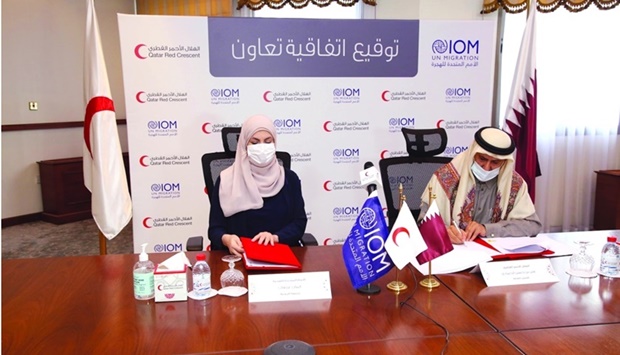Qatar Red Crescent Society (QRCS) and the International Organisation for Migration (IOM) signed Wednesday a co-operation agreement to implement a project aimed at providing community services, mental health, and psychosocial support for the Afghan citizens hosted by Qatar following the recent events in Afghanistan.
Held at the QRCS headquarters, the agreement was signed by Ali bin Hassan al-Hammadi, secretary-general of QRCS, and Iman Younis Ereiqat, chief of Mission of the United Nations IOM in Qatar.

The signing ceremony was attended by Faisal Mohamed al-Emadi, executive director of the Relief and International Development Division at QRCS; Muna Fadel al-Sulaiti, executive director of the Volunteering and Local Development Division; Dr Fawzi Oussedik, head of International Relations and International Humanitarian Law; Aiham Ismail al-Sukhni, head of Planning and Studies; and Fatima Abdulhameed Abdeen, Disaster Response Specialist.
IOM’s delegation comprised Mushfig Eminov, project development and reporting officer; Shaiban Taqa, programme officer, and Ahmed Salih, public relations officer.
Al-Hammadi thanked IOM for the bilateral partnership on many previous humanitarian projects, especially with regard to responding to the recent Afghan crisis.
“The signing of this framework agreement to organise our bilateral work will enhance the existing cooperation towards broader horisons in the coming period,” he said. “We hope that these endeavors will help to mitigate the impact of the crisis on our guests from Afghanistan."
Ereiqat said, “I am proud of signing this agreement to consolidate humanitarian partnership with the State of Qatar and its humanitarian organs, especially QRCS. This is not something new for Qatar, which is always a major supporter of global humanitarian action. Through this cooperation with QRCS, we seek to reach out to as many people in need as possible around the world. IOM has 450 missions in 150 countries."
Under the new agreement, the two parties will work together to support the Afghans displaced to Qatar, with a special focus on children, adolescents, and caregivers, with the aim of alleviating the psychosocial repercussions of their having to leave their home country following the recent humanitarian crisis.
QRCS will work to meet the emergency humanitarian needs of the beneficiaries, focusing on community activities and services (community mobilisation/engagement), mental health, psychosocial support, and individual and group psychological support services.
The affected groups will be involved in initiating and facilitating all activities, to ensure the fulfilment of all needs of subgroups, particularly vulnerable groups like single-parent families, people with physical/mental disability, women, children and the elderly.
The project seeks to reduce psychological stress among the target beneficiaries, maintain their psychosocial well-being, and respond to their existing psychological and social needs.
The activities of the six-month project include providing social activities (educational, cultural, sports, recreational, artistic, volunteering, etc; creating and operating child-friendly spaces and safe spaces for women; organising courses on psychological support, stress management, positive coping mechanisms, etc; providing consultation for those who need it through individual support or group counselling sessions; and facilitating problem-based group support sessions such as violence survivors.
Held at the QRCS headquarters, the agreement was signed by Ali bin Hassan al-Hammadi, secretary-general of QRCS, and Iman Younis Ereiqat, chief of Mission of the United Nations IOM in Qatar.

The signing ceremony was attended by Faisal Mohamed al-Emadi, executive director of the Relief and International Development Division at QRCS; Muna Fadel al-Sulaiti, executive director of the Volunteering and Local Development Division; Dr Fawzi Oussedik, head of International Relations and International Humanitarian Law; Aiham Ismail al-Sukhni, head of Planning and Studies; and Fatima Abdulhameed Abdeen, Disaster Response Specialist.
IOM’s delegation comprised Mushfig Eminov, project development and reporting officer; Shaiban Taqa, programme officer, and Ahmed Salih, public relations officer.
Al-Hammadi thanked IOM for the bilateral partnership on many previous humanitarian projects, especially with regard to responding to the recent Afghan crisis.
“The signing of this framework agreement to organise our bilateral work will enhance the existing cooperation towards broader horisons in the coming period,” he said. “We hope that these endeavors will help to mitigate the impact of the crisis on our guests from Afghanistan."
Ereiqat said, “I am proud of signing this agreement to consolidate humanitarian partnership with the State of Qatar and its humanitarian organs, especially QRCS. This is not something new for Qatar, which is always a major supporter of global humanitarian action. Through this cooperation with QRCS, we seek to reach out to as many people in need as possible around the world. IOM has 450 missions in 150 countries."
Under the new agreement, the two parties will work together to support the Afghans displaced to Qatar, with a special focus on children, adolescents, and caregivers, with the aim of alleviating the psychosocial repercussions of their having to leave their home country following the recent humanitarian crisis.
QRCS will work to meet the emergency humanitarian needs of the beneficiaries, focusing on community activities and services (community mobilisation/engagement), mental health, psychosocial support, and individual and group psychological support services.
The affected groups will be involved in initiating and facilitating all activities, to ensure the fulfilment of all needs of subgroups, particularly vulnerable groups like single-parent families, people with physical/mental disability, women, children and the elderly.
The project seeks to reduce psychological stress among the target beneficiaries, maintain their psychosocial well-being, and respond to their existing psychological and social needs.
The activities of the six-month project include providing social activities (educational, cultural, sports, recreational, artistic, volunteering, etc; creating and operating child-friendly spaces and safe spaces for women; organising courses on psychological support, stress management, positive coping mechanisms, etc; providing consultation for those who need it through individual support or group counselling sessions; and facilitating problem-based group support sessions such as violence survivors.

